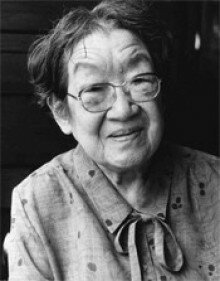
Kiyoko Nagase was born in 1906 and died in 1995 on her 89th birthday. She published her first book of poems in 1930 at the age of 24, and her twelfth book of poems in the year she died. She was active as a poet throughout her 65-year career, producing timeless crystallizations of her heart.
Nagase’s life as a poet is dazzling with the association of legendary poets in the history of the modern Japanese literature. She went to the same kindergarten as Chuya Nakahara (1907-1930). Her mentor when she started writing poems aged 18 was Sohnosuke Satoh (1890-1942). She went to the memorial service of Kenji Miyazawa (1896-1933) one year after his death, and, among his relics, literally stumbled across Kenji’s ‘Ame nimo makezu’ (Not Losing to the Rain), which later became the most famous modern poem in Japan. Reading her essays and aphorisms, some of which are included here, convinces one that this was a woman of great intellectual power, who stood shoulder to shoulder with the literary geniuses of the past century.
But Nagase herself never became a ‘professional’ writer. Throughout her life, she remained a wife and a mother, “a useless woman” as she called herself in a poem, supporting the family by working as a farmer. Most of her poems were written at the kitchen table in the early hours when her husband and children were asleep. While supported by her sharp intelligence, her poems are essentially sensual and cosmic, always spoken in the soft, dark voice of a woman rather than a poet (listen to her recorded reading in this issue).
It is perhaps because of these particular qualities that many contemporary Japanese female poets regard Kiyoko Nagase as their “great mother”, and that her poems continue to attract a large number of female readers from different generations and social status. Empress Michiko of the Japanese royal family is one of them: in fact the Empress loves the poems of Kiyoko Nagase so much she translated one of Nagase’s poems into English: ‘O You Who Come to Me at Dawn’, included in the selection. (Empress Michiko graduated from the prestigious University of the Sacred Heart in Tokyo with a BA in English literature and is known as a devout poetry reader.) The poet and the empress must have shared something in common as wives, mothers, and women.
Bibliography
Poetry
Grendel no hahaoya (Grendel’s Mother), Kajinboh, 1930
Shokoku no tennyo (Heavenly Maidens on Earth), Kawade shoboh shinsha, Tokyo, 1940
Ooinaru jyumoku (A Great Big Tree), Sakurai shoboh, Tokyo, 1947
Utsukushii kuni (Beautiful Nation), Ro shoboh, Nara, 1948
Honoo ni tsuite (On Flames), Chiyoda shoin, Tokyo, 1950
Sanjyo no shisha (The Dead on the Mountain), Nippon mirai hakkosho, Tokyo, 1954
Bara shishuh (Rose Poems), Matoba shoboh, Tokyo, 1958
Asia ni tsuite (On Asia), Kibarasha, 1961
Umi wa riku eto (Sea Surging onto Land), Shichosha, Tokyo, 1972
Watashi wa chikyu (I am the Earth), Sekichusha, Tokyo, 1983
Akegata ni kuru hito yo (To You who Come to Me at Dawn), Shichosha, Tokyo, 1987
Himiko yo Himiko (Himiko, Oh, Himiko), Techosha, 1990
Haru ni nareba uguisu to onaji ni (Like a Nightingale upon Arrival of Spring), Shichosha, Tokyo, 1995
Essays
Tanshoh shuh (Aphorisms), Shichosha, Tokyo, 1974
Chou no meitei (Intoxicated Butterfly-Aphorisms I), Shichosha, Tokyo, 1977
Nagareru kami (Flowing Hair-Aphorisms II), Shichosha, Tokyo, 1977
Honoo ni maki o (Firewood into Flames-Aphorisms III), Shichosha, Tokyo 1980
Uguisu no maneki (Nightingale’s invitation), Renga Shoboh Shinsha, 1983
Irodori no kumo (Colorful Clouds-Aphorisms IV), Shichosha, Tokyo, 1984
Sareba subete natsukashii hibi (Autobiography), Fukutake Shoten, Okayama, 1990





